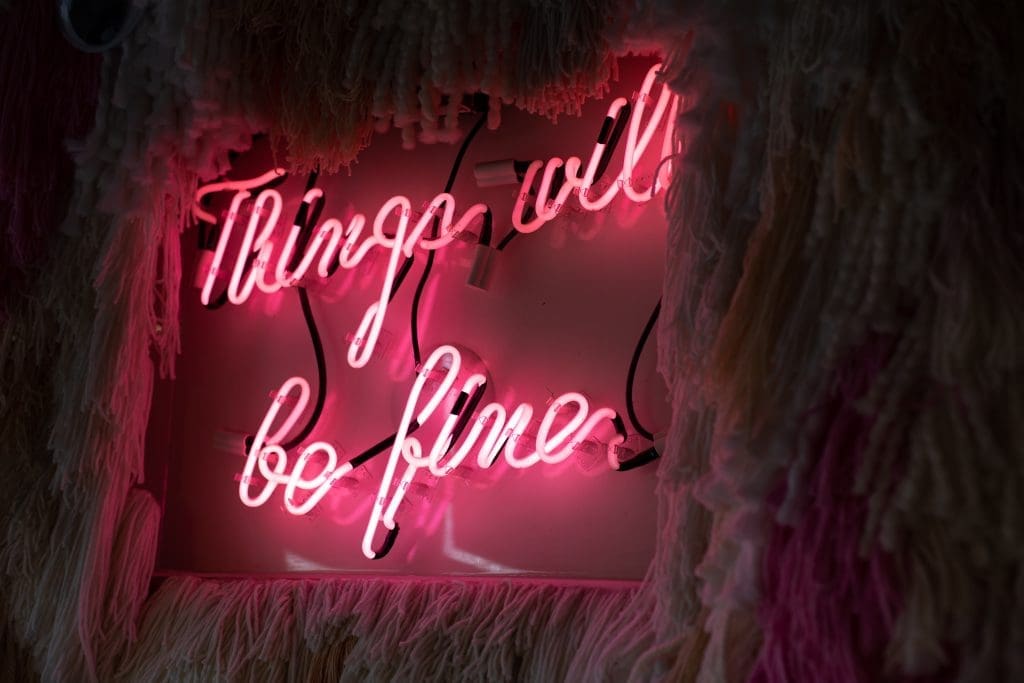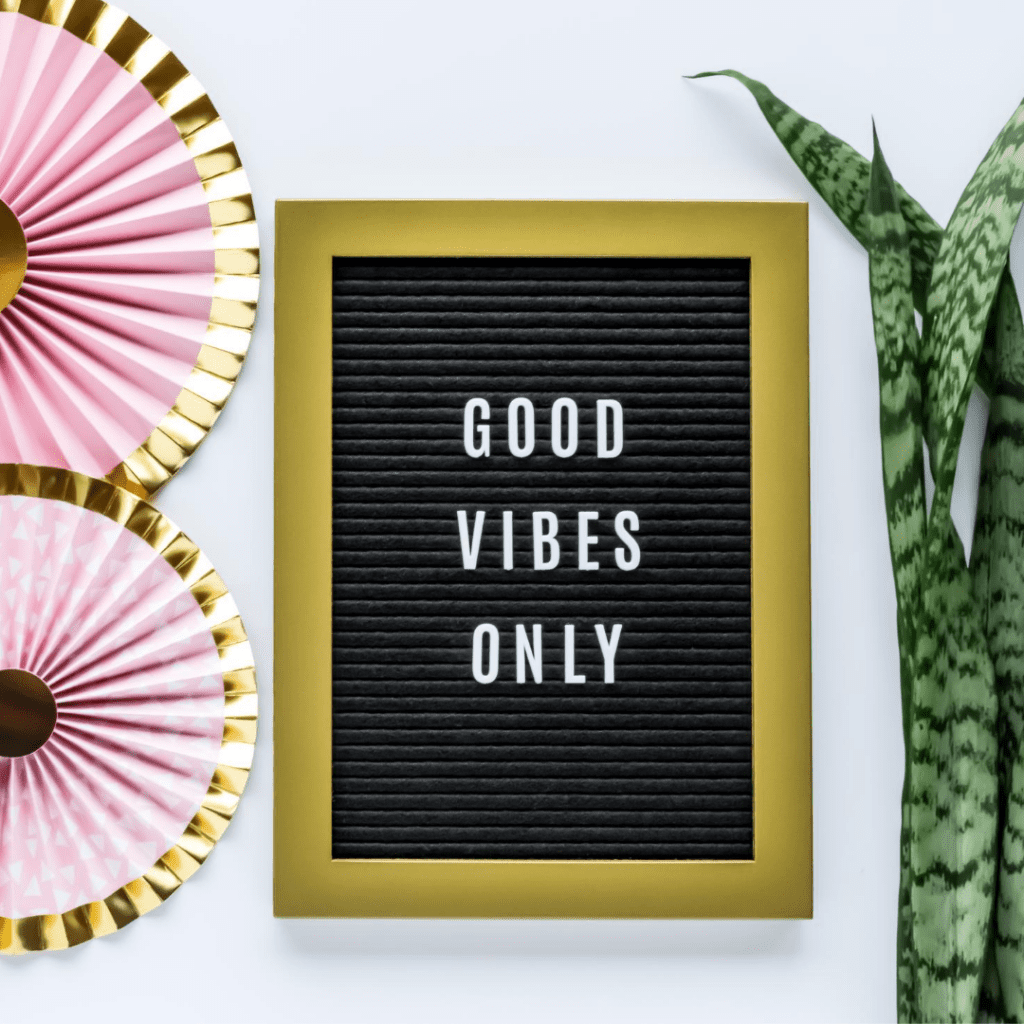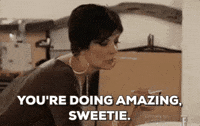Kelly Bertrand looks at the idea of toxic positivity – yeah, turns out that’s a thing
So it turns out that you can actually be ‘too positive’.
I started thinking about the idea of it a few months ago. It was just hours after receiving some grim news and I was sitting on the couch with a friend, finishing off the last drops of a bottle of truly bad ‘Champagne’ and trying to scrape the burnt bits off the top of a tray of Alison Holst sausage rolls that we’d left in my demonic oven for too long.
Scrolling through my phone with half-cut eyes, I could just make out the dozens of well-meaning messages from friends, family and the inevitable people who just wanted the tea, and I realised how many of them simply read, ‘look on the bright side!’ or ‘things will turn out great!’ or even a ‘cheer up, things could be worse!’.
I mean yup, they could definitely be worse. We even managed to get most of the burnt bits off the sausage rolls, and we dug out a bottle of bubbles that didn’t taste like it had been served out of a netball shoe.
But those messages still made me want to hurl my phone through the wall, find the bottle of tequila I’ve hidden from myself at the back of the wardrobe and drunk dial a few people that I thought deserved a piece of my mind about the day’s events. (I settled on sending one drunk email a few weeks later, but that whoopsie is another story.)

But it did get me thinking about how positivity – this shiny, aspirational and sought-after concept that so much of our lives now centres around, sometimes isn’t helpful in the slightest.
A quick Google search confirmed that too much positivity – ‘toxic positivity’ – is a real thing that’s really stuffing up people’s lives, and one I’m all for stamping out as fast as an Australian prime minister leaves office.
Toxic positivity is where you portray yourself to be perfectly, wonderfully happy even when you’re not, and always looking on the bright side and ignoring real problems and issues in the process. It’s its own culture – think of all of the scripty word art with the phrase “Good Vibes Only!” that replaced everyone’s ‘Live, Laugh, Love’ and you’ll get the gist. Once someone has curated a happy, carefree and positive brand, either in person or on social media, it’s hard to break away to normality and return to a state of vulnerability.
While normal amounts of positivity are great for pretty much every area of our health, as psychologist Dr Ruth Jillings tells us, it quickly becomes problematic when it’s taken up a level.
“Always trying to look for the positive in any situation is still a great strategy, but where it becomes toxic is when people take it to excess,” she says.
“Say in your situation, where the career rug has been pulled out from under you temporarily. If someone says to you, “oh well, chin up, look at the bright side, pivot”, what that does is completely invalidate your experience. It says to you, if you’re having anything less than positive feelings, then you’re not good enough. It denies our human experience, and we’re designed for the whole human experience, the good and the bad. And by denying it, it doesn’t make the feelings or the negative emotions go away, they just wait.
“You’re allowed, and you should, feel them. You’re allowed to feel fearful or anxious or distressed or whatever it is. It’s ok.”
Toxic positivity was on the rise even before Covid-19, fuelled in large part by our reliance on social media. Even if we all rationally realise Instagram is nothing but a person’s carefully curated highlight reel, the prevalence of happy, shiny, white-toothed influencers and celebrities, as well as our own family and friends’ greatest hits, is enough to make you think everyone else’s lives are as happy and shiny as their pictures and in order to compete, so must yours be.
There’s a spin off area in terms of optimism which is all about realistic optimism. Some people are just naturally optimistic- “Don’t worry guys, it’ll turn out great!”. Well, half the time it won’t. Just positive thinking won’t carry you through. But realistic optimism – when you’ve looked at the odds, you’ve done the preparation and you’ve worked hard – that’s when there’s a good chance it’ll work out ok, rather than just relying on wild hope.
DR RUTH JILLINGS
Dr Jillings says although the inside of your screen might look like influencer Disneyland all the time, the reality is far from this image (My God, as I typed that I had a great mental flash of what influencer Disneyland would look like – a perfectly-lit wellness spa themed amusement park with collagen smoothies on tap, meal kit boxes for everyone, frozen grapes as snacks and confetti with affiliate codes and positive affirmations raining down everywhere).
“We just can’t feel upbeat and perfect all the time,” Dr Jillings nods. “It’s the social media thing where there’s a sense of shame and the idea that if we’re not perky, we’re somehow less. Again it’s to do with the excess. Of course we should all be grateful that we’re not breaking rocks for a living. We live in a gorgeous country, many of us have enough to eat and a warm place to sleep, so by that definition our lives should be an absolute cakewalk. And I’m not saying get stuck in the negative emotions – but you need to feel them. And then in our good times we can emerge from them.”
As well as dealing with everyone else’s well-meaning but still harmful toxic positivity, it’s easy to get caught up in our own as well. Think about yourself for a second – have you taken the time to sit down and really think about some of the events of this year? Have you allowed yourself to feel sad, or anxious, or angry? Or do you do your best to push them away and focus on the fact that things could be worse?


And, how do you know if you’ve crossed the line from being a genuine and healthy positive person to someone that’s denying themselves the ability to feel and heal?
“Good question – you probably don’ t know in the first instance,” tells Dr Jillings.
“But you’ll start to get a feeling that it’s less than authentic – say, when you feel like you can’t be yourself and you’re thinking of a negative thought, and you don’t feel like you can express it. It’s not an instant warning sign, but it’s the feeling of being inauthentic. I’ve met people before who have strayed so far away from their actual feelings, that they’re afraid of them, and that’s not somewhere you want to be.”
Meshing positivity and pragmatism can be a tricky equation, especially for New Zealanders who are inherently programmed with a “she’ll be right” mentality and the desire to try our best to appear like everything is fine.
“Many people are afraid to be authentic with emotions, because a lot of the time you have to be careful with whom you share your emotions,” says Dr Jillings.
“People say insensitive things all the time, and some of it is just hurtful – oh, it’s God’s will, plenty more babies in your future. Things like that – ‘but ‘I’m trying to be positive!’ they’d say. That’s what I mean about the excess.”


Dr Jillings says there are a few ways to combat you own – and other people’s – toxic positivity.
“Maybe there’s a circle at which you keep that veneer of positivity on, and it’s your inner circle who you’re authentic with. Maybe there are people who you don’t want to open yourself up with, and that’s fine.
“And if you’re trying to comfort others who have lost something, the actual, appropriate response is simply- ‘This really sucks. You’re in real hard yards here, this must be difficult to adjust to’. I think that’s more therapeutic and more helpful, rather than, ‘well you now what, 2022 is probably going to be a great year for you!’”
Simply, acknowledge that you can feel a whole bunch of crazy, messed up and contradictory emotions at one time, try and reflect on what actually is giving you any anxiety or fear, and most of all, be kind to yourself.

